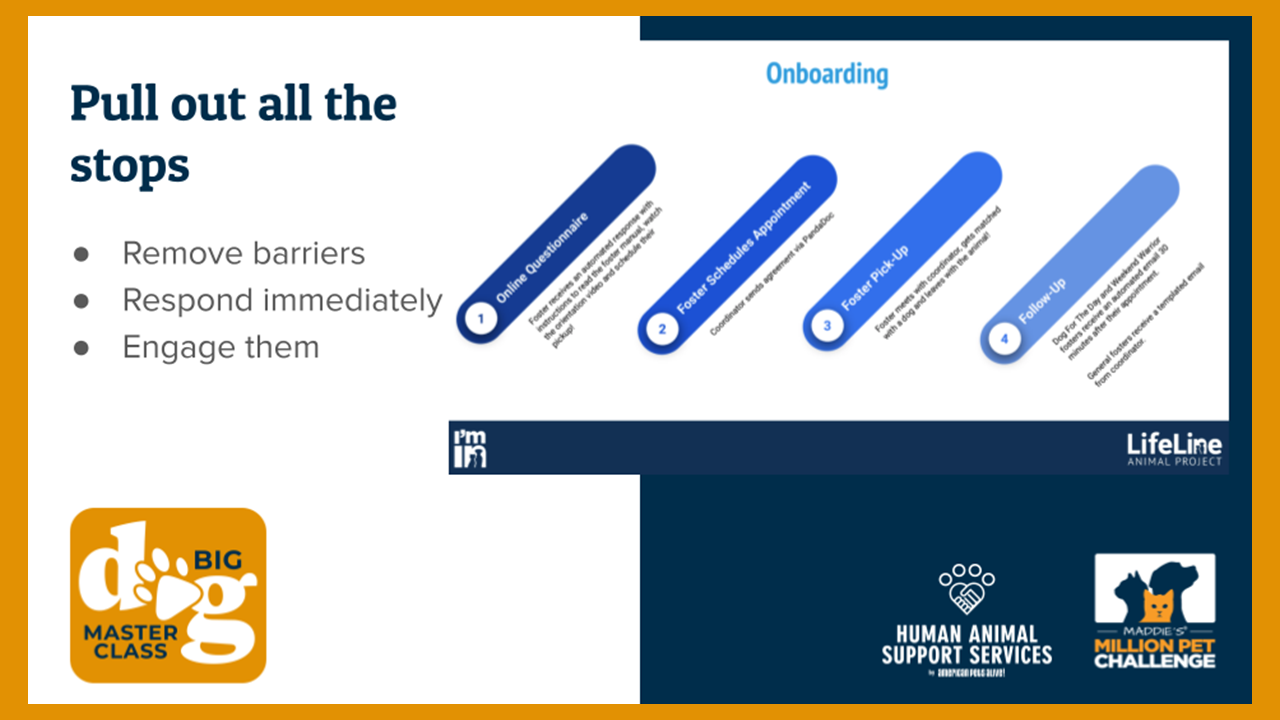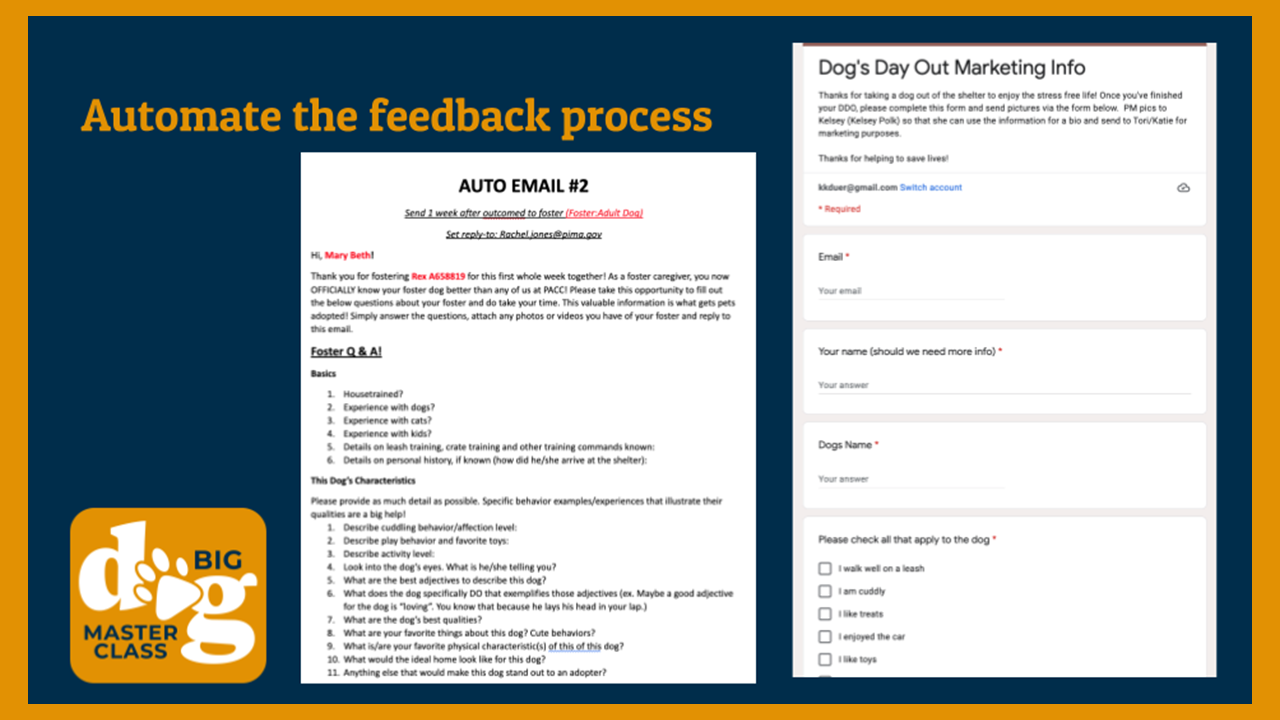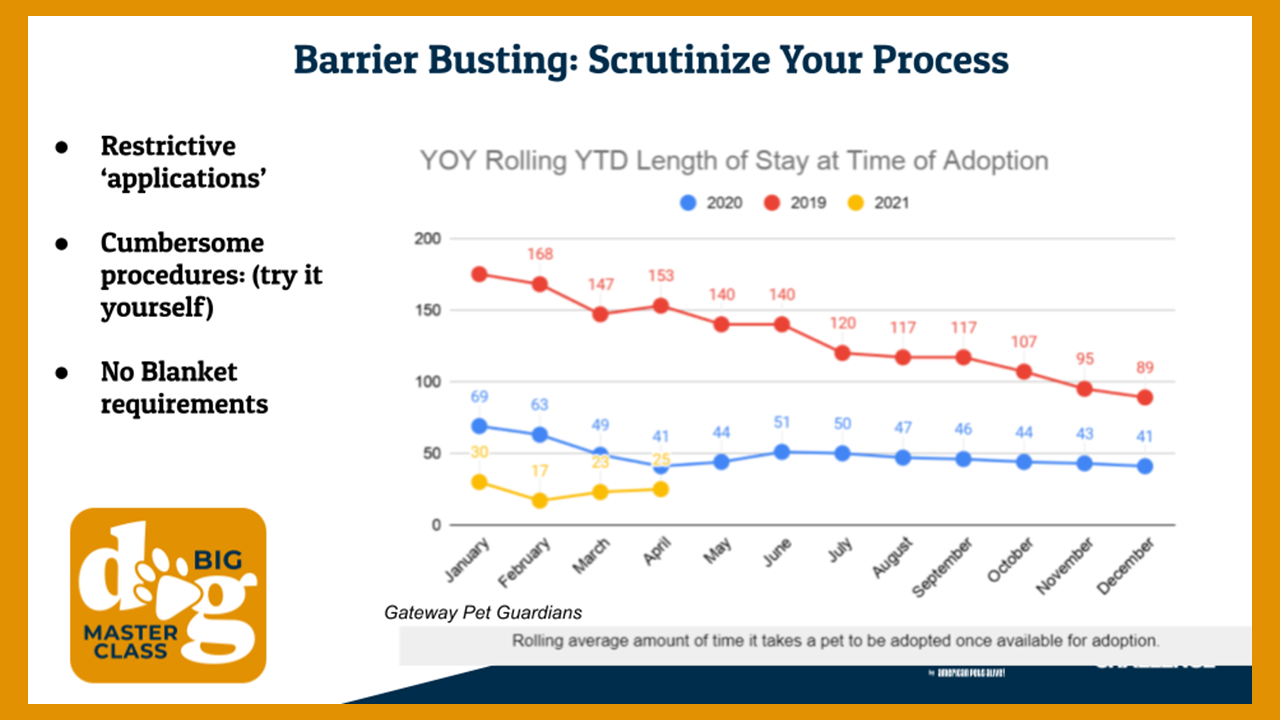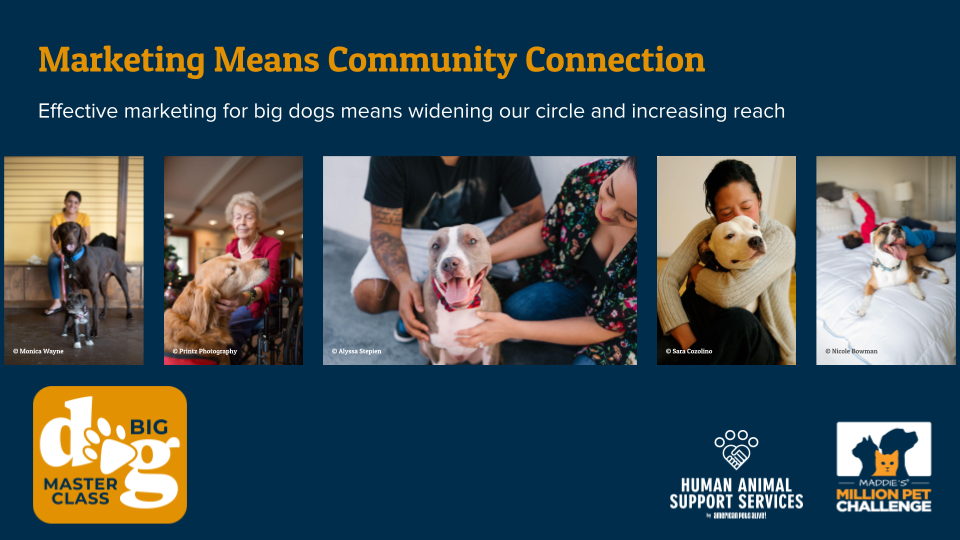
Foundations of Foster Programming Collection
-
Enroll
- All Users - Free!
This collection of courses and resources cover the fundamentals of running a successful foster program, including data collection and how to run many different types of foster programs.
Organizations with successful foster programming have the following key characteristics:
- Measurable goals for the foster program are set and relevant data is tracked, including number and types of pets placed in foster homes, active and inactive foster caregivers, length of stay in foster and more.
- 50% or more of pets are sent to foster.
- The foster program is adequately staffed.
- A range of types and durations of fostering is offered.
- Foster is a possibility for nearly every pet.
Maddie's University has more foster collections, each focused on a specific topic about foster programming. You can see the listings for all the foster collections in the catalog.
keywords: foster collection, foster programming, foster foundations, business foster, behavior foster, behavioral foster, finder to foster, finder-to-foster, foster to adopt, foster-to-adopt, fospice, hospice foster, safety net foster, urgent care foster, emergency foster, short-term foster, short term foster, field trip foster, doggy day out, overnight foster, sleepover foster, weekend foster
-
Contains 3 Component(s), Includes Credits
Start an adult dog foster program or expand the capacity of your existing program
Having a robust foster program is essential to finding live outcomes for adult dogs. In this course, you will learn how to start an adult dog foster program or increase the capacity of your existing program through effective communications and marketing, improved logistics including automated processes, and use of volunteers. This course replaces the former Growing Your Adult Dog Foster Program course and covers similar material, but with new videos and resources. The course should give new programs everything they need to implement adult dog foster and give existing programs essential tips for expanding capacity.
-
Contains 8 Component(s), Includes Credits
Learn how to implement the model Cat Adoption Team uses to foster more than 1200 kittens and cats and adopt out about 3200 annually
Cat Adoption Team (CAT) has honed its Fostering 4 Rock Stars model over time, enabling them to serve an ever growing number of kittens and cats. In this course, CAT shares all facets of its foster program, including foster and foster mentor training, foster and foster mentor bags, fundraising, marketing, socialization and how they monitor their program for improvements. CAT includes all of the templates, manuals and protocols they use, so you can customize them for your organization. Students who complete this course will have everything they need to start or expand their kitten and cat foster programs.
Earn 4 hours of Certified Animal Welfare Administrator (CAWA) and National Animal Care & Control Association (NACA) continuing education credits.
keywords: foster, cats, kittens -
Contains 7 Component(s), Includes Credits
Learn how to create and run these lifesaving programs
Short-term foster programs, including field trips, are relatively easy to manage and can be run entirely by volunteers. They are a powerful tool for helping long-stay pets find positive outcomes, especially larger dogs. Because these programs require a shorter commitment, they draw in supporters who might otherwise be hesitant to foster. A significant portion of short-term foster caregivers become longer-term foster caregivers, expanding your foster base. In other words, short-term foster is great for pets, great for the community, and great for your organization. And you can run them at almost no cost. Why wouldn't you have these programs?
In this course you will learn how to create or grow your short-term foster and field trip programs. Upon completion, students' organizations are eligible to apply for a Dog Field Trips grant from Petfinder of up to $2000. (Applicant's organization must be an active Petfinder member with adoptable pets listed on their Petfinder page.)
This course has been pre-approved for 4.0 Certified Animal Welfare Administrator continuing education credits by The Association for Animal Welfare Advancement.
keywords: adoption, marketing, overnight
-
Contains 3 Component(s), Includes Credits
Get pets out of your shelter and into foster homes in all kinds of emergencies, including space crises
Emergency foster programs are helping organizations across the country continue to save lives during population spikes, natural disasters, outbreaks of contagious illness, hoarding situations, building renovations, and more. You might call emergency foster programs the "backup plan" for situations that put animal welfare organizations in crisis, including simply running out of space. After successfully completing this course, you will be able to:
- Recognize the power of an emergency foster initiative to build your supporter base
- Identify and tailor your initiative to a range of shelter emergencies
- Recruit emergency foster caregivers using a variety of strategies
- Successfully message your community about your foster initiative
- Know where to find support
This course is authored by Kelly Duer, Senior Community Solutions Specialist for Maddie’s Fund®. This course is pre-approved for 1 hour of continuing education credit from the Association for Animal Welfare Advancement (AAWA) and the National Animal Care & Control Association (NACA).
-
Contains 6 Component(s), Includes Credits
Learn how Finder Foster programs can help you reunite more animals with their families and promote animal well-being
What is a "Finder Foster" program - how does it work, how long do finders need to hold an animal and what are other important legal aspects of these programs?
In this course you’ll learn how Finder Foster programs can help you reunite more animals with their families, promote animal well-being and minimize stress by reducing time spent in the shelter, and reserve resources for animals who really do need to come in—all by engaging people who are already helping animals in your community.
We've asked a legal expert to help us understand these important details. We'll be using the state of California and its legal requirements for these programs as an example. You'll want to speak to your own legal counsel to make sure your area (state, county, city or other locality) doesn't have different regulations in place.
As part of Maddie's® Million Pet Challenge Learniverse program, Bruce Wagman, Lead Counsel for the Shelter Policy and Legal Services (Shelter PALS) program of the San Francisco SPCA, covers the concepts, legal specifics, and requirements of finder-foster programs for animal shelters in the state of California. The country’s first and only legal aid organization dedicated exclusively to the needs of animal shelters, Shelter PALS leverages the expertise of the best legal minds in animal welfare, and channels significant legal aid to animal shelters. Although the specific information in this course is applicable to and derived from California state law, many of the principles will be similar in other states.
- Learn more about SF SPCA's Shelter PALS
- Learn more about Maddie's®️ Million Pet Challenge Learniverse. #ThankstoMaddie
This short, self-paced course has been approved for 1.0 Certified Animal Welfare Administrator (CAWA) continuing education credits by The Association for Animal Welfare Advancement and by National Animal Care and Control Association.
This course has been approved for 1 hour of continuing education credit until July 25, 2026 in jurisdictions that recognize RACE approval. Upon completing the course and passing the quiz, upload your certificate to https://CEBroker.com. This is the broker used by the AAVSB to track your continuing education credits.
Keywords: Animal Care Laws, Finder Foster, Lifesaving.
PLEASE CONTACT: learniverse@sheltermedportal.com if you have any questions or concerns about this course.
With the Maddie’s®️ Million Pet Challenge, the Five Key Initiatives of the Million Cat Challenge have expanded to include other species at risk in shelters and evolved into the Four Rights.
Within the Four Rights, every element works in concert to support one another: animals and people are treated as individuals, empowering shelter staff to make the best decisions for everyone; community safety net services are in place and flourishing; and humane care within the shelter is provided, with appropriate outcomes for the animals that do come in, allowing shelters to deliver the Right Care, in the Right Place, at the Right Time, and to the Right Outcome.
This course focuses on how Finder Foster programs support the Right Place, Right Care, and Right Outcome components of the Four Rights.
Learn more about Maddie's®️ Million Pet Challenge Learniverse. #ThankstoMaddie
You can also join the discussion about these concepts over on Maddie's Pet Forum in the Shelter PALS Legal Series Discussion Group

Click to visit the Discussion Group (will open in a new window/tab).

We have a dedicated discussion group on Maddie's Pet Forum to discuss the Shelter PALS Legal Series. Bring your questions, comments, thoughts, and suggestions, or just see what others are thinking about these ideas.

Click to visit the Discussion Group (will open in a new window/tab) 
Bruce Wagman
Lead Counsel
San Francisco SPCA - Shelter Policy and Legal Services (Shelter PALS)
For almost three decades, Bruce Wagman has been using his legal education and well-honed skills to help animals in all sectors of society, and benefit both society and the animals themselves. He is the only lawyer running an exclusive animal law practice in a major United States firm. He litigates, drafts animal-friendly legislation, oversees rescue operations, and consults clients who care for and protect animals. He has published two major works, the leading casebook for law schools nationwide—Animal Law: Cases and Materials—and a global survey of animal laws, A Worldview of Animal Law, the only global survey of animal law. Bruce also founded Project Chimps, a chimpanzee sanctuary that is home to chimpanzees retired from a research laboratory. Bruce’s clients include numerous animal protection organizations as well as private individuals. He has worked on behalf of many species, including alpacas, bears, birds, cats, chickens, chinchillas, chimpanzees, cows, deer, dogs, dolphins, ducks, elephants, elk, ferrets, geese, goats, gorillas, horses (domestic and wild), lions, mice, monkeys, pigs, rabbits, sharks, turkeys, whales, and wolves. In addition to his role as Lead Counsel of Shelter PALS, Bruce currently serves as Of Counsel at Riley Safer Holmes & Cancila LLP.
Learn more about the San Francisco SPCA - Shelter Policy and Legal Services (Shelter PALS)
-
Contains 8 Component(s), Includes Credits
2 great short sessions - "Double Your Big Dog Fosters in 30 Days" and "How to Get Big Dogs Adopted From Foster" with Kelly Duer
Presenter: Kelly Duer, Foster Care Specialist, Maddie's Fund
Session 1: Double Your Big Dog Fosters in 30 Days (27 minutes)
You’ll learn what the latest market research says about messaging and techniques that can turn potential fosters into applicants, and how short-term foster programs can help you find the fosters and adopters you need.

Session 2: How to Get Big Dogs Adopted From Foster (20 minutes)
You’ll learn the most effective strategies for getting dogs adopted from foster - including marketing them and getting them adopted without needing to return to the shelter. You’ll learn what the latest market research says about messaging and techniques to find the adopters you need, and how organizations with the most robust foster programs are empowering foster caregivers to assist in efforts to market their foster pets online.

Learning Objectives:
- Learn how to create a community culture of fostering, normalizing the fostering of big dogs
- Learn messaging techniques for motivating potential fosters to sign up
- Understand the major reasons people decide not to foster and the strategies that are most effective in overcoming these barriers
- Develop a protocol for marketing and adopting pets from foster homes
Continuing Education:
- Earn 1.0 Certified Animal Welfare Administrator continuing education credits from The Association for Animal Welfare Advancement and from the National Animal Care & Control Association.
- This course has been approved for 1.0 hour of continuing education credit in jurisdictions that recognize RACE approval through 3/6/28. Pass the quiz with a score of 70% or higher to access your CE certificate and then upload it to https://CEBroker.com. This is the broker that the AAVSB uses to track your continuing education credits.
Keywords: foster care, dog foster, management system for big dogs, animal behavior, big dogs, large dogs, dogs, Maximize physical and behavioral health, Animal & Population Management, Strategic & Operational Planning, Policies & Procedures, Foster Care, webcast, MMP
BD Day 1
Kelly Duer
Senior Community Solutions Initiative Specialist - Foster Care Specialist
Maddie's Fund
As Senior Community Solutions Initiative Specialist, Kelly's focus is on helping shelters and rescue organizations increase lifesaving through the implementation of robust foster care programs. Her role includes consulting with shelters, creating and providing training for organizations and their foster coordinators, writing and assisting with research on foster care.
Kelly previously coordinated a foster program that brought orphaned children to the United States in order to find them permanent adoptive homes, worked as the Foster Expansion Coordinator for a national study of foster care, and assisted with the behavioral foster study that was conducted at the Fairfax County Animal Shelter. Her work with foster care and social media has been featured in many national publications, websites and networks, including Animal Sheltering magazine, the Huffington Post, Best Friends magazine, BarkPost, iheartdogs.com, HuffPost Live and Fox News.
-
Contains 8 Component(s), Includes Credits
2 great short sessions - "Proven Strategies for Minimizing Length of Stay" with Michele Figueroa and Clare Callison AND "Big Dog Marketing - The Easy Way" with Arin Greenwood, Caitlin Quinn and Kasey Spain
Presenters:
Michele Figueroa, Program Director, Pima Animal Care Center
Clare Callison, Maddie’s® Director of National Pet Supply and Demand, American Pets Alive!
Arin Greenwood, Editor, Writer, Communications Consultant, Human Animal Support Services
Caitlinn Quinn, Director of Operations, HeARTs Speak, Inc.
Kasey Spain, Marketing and Communications Senior Manager, American Pets Alive! and Human Animal Support Services
Session 1: Proven Strategies for Minimizing the Length of Stay (24 minutes)
Learn strategies for minimizing length of stay for medium and large dogs, from in-shelter techniques through adoption marketing.

Session 2: Big Dog Marketing - The Easy Way (26 minutes)
Topics discussed include: how to design and create a pipeline for great marketing materials on dogs in care, ensure that pets’ online profiles are kept up to date and that each dog is marketed robustly.

Learning Objectives:
- Learn about barriers to adoption and how to avoid them
- Learn what an intake-to-placement program is and how it works
- Learn the difference between marketing and adoption counseling and how to ensure transparency while keeping them separate.
- Learn how to create a protocol to ensure that every dog in their care is robustly marketed, with no one slipping through the cracks.
Continuing Education:
- Earn 1.0 Certified Animal Welfare Administrator continuing education credits from The Association for Animal Welfare Advancement and from the National Animal Care & Control Association.
- This course has been approved for 0.5 continuing education credits in jurisdictions that recognize RACE approval through 3/6/28. Pass the quiz with a score of 70% or higher to access your CE certificate and then upload it to https://CEBroker.com. This is the broker that the AAVSB uses to track your continuing education credits.
Keywords: length of stay, adoption marketing, marketing big dogs, Community support, live outcomes, obstacles to outcomes management system for big dogs, animal behavior, big dogs, large dogs, Maximize physical and behavioral health, Animal & Population Management, Strategic & Operational Planning, Policies & Procedures, webcast
BD Day 2
Michele Figueroa
Program Director
Pima Animal Care Center
Director of Internal Operations at Pima Animal Care Center
Clare Callison
Maddie’s® Director of National Pet Supply and Demand
American Pets Alive!
Clare Callison is the Maddie’s® Director of National Pet Supply and Demand for American Pets Alive! and serves on the Board of Directors for CARE (Companions and Animals for Reform and Equity). She provides guidance and support to help organizations build robust lifesaving programs and improve operations to better serve people and pets. Clare specializes in helping organizations grow their transport relationships and increase their lifesaving through rescue partnerships and open adoption practices. Before joining American Pets Alive!, she was the Director of Operations for San Antonio Pets Alive for 5 years. Because of her heavy involvement, San Antonio has gone from a 28 percent live release rate to a 90 percent live release rate in over three years. Clare enjoys helping others seek lifesaving solutions to common challenges that exist in working in a high-volume, fast-paced animal welfare organization.
Arin Greenwood
Editor, Writer, Communications Consultant
Human Animal Support Services
Columbia Law School grad turned writer, editor, communications professional, and animal advocate.
I was The Huffington Post's animal welfare editor. My stories about cats, dogs, and other critters have been published in The Dodo, The Washington Post, Slate, The Today Show's website, the American Bar Association Journal, and many other publications. I now write, edit, and consult for animal nonprofits, and other clients. Please reach out to chat about possible projects we could work on together.
My novel Your Robot Dog Will Die was published by Soho Teen in 2018. Robot Dog won Creative Loafing's Best of the Bay award for best local author, was one of YALSA’s 2019 Quick Picks for Reluctant Readers, and was a Children's Book Council Hot Off the Press pick. Robot Dog has been optioned by Centerboro Productions to turn into an animated series!
Please feel free to get in touch here on Linkedin, at aringreenwood at gmail.com, on Facebook (https://www.facebook.com/aringreenwood), or on Twitter (https://twitter.com/arin_twit).Caitlinn Quinn
Director of Operations
HeARTs Speak, Inc.
Caitlin is passionate about working with shelters and rescues to reimagine the way they tell their stories and connect with new audiences. She has served in the animal welfare field since 2008 and early on had the honor of working closely with diverse organizations across the U.S. to maximize resources, redesign policies, & find life-changing marketing solutions. In 2015 she got her MPA with a concentration in nonprofit management and in 2021 she began teaching shelter marketing for the University of Florida Master's in Shelter Medicine program. She currently shares her life with a petite brindle pit bull named Sally.
Kasey Spain
Marketing and Communications Senior Manager
American Pets Alive! and Human Animal Support Services
Kasey Spain is Maddie’s® Director of Marketing and Communications for American Pets Alive! and the Human Animal Support Services project. With a background as a Creative Director specializing in design and branding, Kasey has worked with brands such as Neiman Marcus, Lincoln Property Company, Chuy’s, Choctaw Casinos, TIGI Haircare and many more.
Kasey previously served as the Marketing and Communications Manager for the Austin Animal Center, the city’s municipal shelter. She received an Austin Addy Award and an Emmy nomination for her work on a lost pet awareness campaign produced for Austin Animal Center. As part of her contribution to the HASS project, Kasey leads the Marketing and Communications Working Group and Job-Alike peer group, and is passionate about helping HASS partner organization’s marketing staff to transform their services and communities through effective communication.
-
Contains 3 Component(s), Includes Credits
Learn how to build a successful foster program that can grow with your organization
With a viable foster program it's possible to begin saving lives and transforming your community to no-kill, even if you don't have a shelter. Learn how to build a successful foster program that can grow with your organization by developing teams of volunteers. You will be able to expand your capacity to save more animals.
Presenter: Lindholm, Duer
Maximize In-Shelter Welfare, Animal & Population Management,live outcomes,foster programs, foster care,pet fostering, community outreach, dog foster, dog foster care
-
Contains 4 Component(s), Includes Credits
Learn to safely handle and treat feral and fractious cats
This is a practical course covering treatment and handling of feral and fractious cats. Videos demonstrate handling techniques. This course is authored by Monica Tarant, Chief Innovation Officer: Feline Lifesaving at Cincinnati Animal CARE with The Joanie Bernard Foundation.
keywords: community, cats, medical, treatment, panleuk, URI
-
Contains 3 Component(s), Includes Credits
Keep cats in their homes and out of your shelter or rescue
In this course you'll learn how the all-volunteer Cat Behavior Team at Austin Pets Alive! keeps cats in their homes. Through data analysis, you'll be able to focus your cat team's training on counseling that will be most useful for pet retention. And you'll learn how APA! makes sure its long-stay cats are getting the attention they deserve. This course is authored by Monica Tarant, Chief Innovation Officer: Feline Lifesaving at Cincinnati Animal CARE with The Joanie Bernard Foundation.
This course has been pre-approved for 0.75 Certified Animal Welfare Administrator continuing education credits by The Association for Animal Welfare Advancement.
Useful tools and how-to's for foster programming
A detailed how-to guide for setting up a behavior foster program, followed by sample programs from various organizations
Examples of programs in which businesses or other organizations act as foster caregivers
Examples of programs that ask community members who find a pet to hold them while an effort is made to locate the pet's family
Examples of programs that give adopters the opportunity to foster the pet for a time period before finalizing the adoption
Examples of programs that connect terminally ill or very senior pets who still have a good quality of life with foster caregivers for end-of-life care
How-to's and examples of programs that provide temporary care for pets whose owners are in crisis, but who would like to keep their pets in the long term
Resources and sample short-term foster programs, including field trips, sleepovers, holiday foster, and emergency foster. Note that emergency foster is not only used in disease outbreaks, hoarding cases and natural distasters; emergency foster initiatives are highly useful (when used sparingly) for recruiting new foster caregivers and can be used in any circumstance, including a forecasted space crisis. In fact, all short-term foster programs provide the opportunity to recruit new foster caregivers with a low-commitment option. Many short-term fosters become longer-term fosters.
